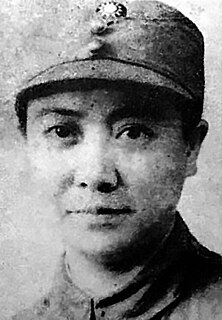 W
WDeng Xihou was a Chinese general and politician.
 W
WHu Lanqi, also spelled Hu Lanxi, was a Chinese writer and military leader. She joined the National Revolutionary Army in 1927 and the Chinese branch of the Communist Party of Germany in 1930. She was imprisoned by Nazi Germany in 1933 and wrote an influential memoir of her experience, for which she was invited by Maxim Gorky to meet him in Moscow. After the outbreak of the Second Sino-Japanese War in 1937, she organized a team of women soldiers to resist the Japanese invasion, and became the first woman to be awarded the rank of Major General by the Republic of China. She supported the Communists during the Chinese Civil War, but was persecuted in Mao Zedong's political campaigns following the Communist victory in China. She survived the Cultural Revolution to see her political rehabilitation, and published a detailed memoir of her life in the 1980s.
 W
WHu Kexian was a Chinese general who served in the National Revolutionary Army (NRA) during the Second Sino-Japanese War and the Chinese Civil War. The sixth year graduate of the famous Whampoa Military Academy at the age of 19, Hu Kexian became a Lieutenant General at the age of 28 and was in charge of the only heavy artillery regiment of the ROC army during his time. His heavy artillery regiment played a major role during the Second Sino-Japanese war (1937–1945) such as the Battle of Shanghai because the artillery regiment was trained under the German Nazi instructors and possessed the most effective weaponry in both skill and technology for its time.
 W
WLi Jiayu was a KMT general from Sichuan who was killed during the Second Sino-Japanese War. A veteran of the Xinhai Revolution and the Second Revolution, he served as a regimental officer in the 6th Brigade of the Sichuan clique army, which was part of the Sichuan clique Army 3rd Division commanded by warlord Deng Xihou. He was promoted to commanding officer of the 6th Brigade in 1922 by his superior officer Deng and later promoted to major general and commander of the 1st Division of the Sichuan clique Army in September 1923. In August 1924, he was promoted to Lieutenant General in the Sichuan clique army. On May 21, 1944, he was killed in action in Henan province. On June 22, 1944, he was posthumously promoted to full General.
 W
WLiu Wenhui was one of the warlords of Sichuan province during China's Warlord era. Liu who rose to prominence in Sichuan in the 1920s and 1930s, came from a peasant family. At the beginning of his career, he was aligned with the Kuomintang (KMT), commanding the Sichuan-Xikang Defence Force from 1927 to 1929. The western part of Sichuan province was then known as Xikang. Bordering Tibet, the region had a mixed population of Tibetans and Han Chinese.
 W
WPan Wenhua, courtesy name Zhongsan (仲三) was a Kuomintang general from Sichuan.
 W
WSun Zhen was a General of the National Revolutionary Army during the Second Sino-Japanese War and Chinese Civil War.
 W
WTang Shizun (唐式遵) was a KMT general from Sichuan during World War II.
 W
WTian Songyao, Tin Chung-yao, 田颂尧 (1888–1975), warlord of the Sichuan clique and later Kuomintang general.
 W
WWang Lingji (王陵基) was a Kuomintang of China (KMT) general from Sichuan. In 1913, he fought against the Beiyang government. He fought against the Chinese Workers' and Peasants' Red Army. He commanded the 30th Army Group from April 1938 to October 1945. He fought against the Imperial Japanese Army in Hubei; Jiangxi and Hunan.
 W
WWang Zuanxu (王纘緒) was a Kuomintang general from Sichuan.